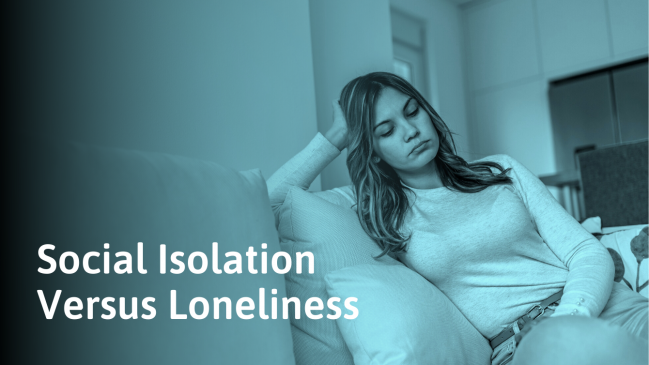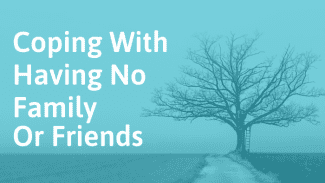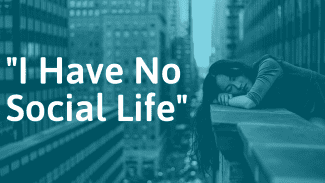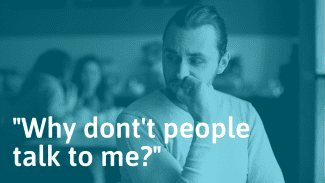Social connections are an important part of daily life. They might be loose, surface connections, for example, waving to a neighbor on your way to work, or deeply meaningful ones, such as a connection with a best friend or romantic partner.
When we don’t have those social relationships, we’re at risk of social isolation and feelings of loneliness. As well as being emotionally difficult, this can lead to serious health problems.
Loneliness, in particular, is prevalent and distressing. In one study, over half of all young people reported being depressed because of loneliness.[1]
We’re going to look closely at what social isolation and loneliness are, what effects they can have on you, and what you can do about them.
Sections
- Social isolation vs. loneliness
- Why are they bad for you?
- What can you do?
- Risk factors
- Social isolation and COVID-19
- Common questions
What is the difference between social isolation and loneliness?
Social isolation is an objective state where someone has few social connections and can go long periods without interacting with other people. Loneliness is a feeling that you don’t have enough social connections or that your social connections are not giving you the fulfillment you would like.
There is often some overlap between isolation and loneliness. Someone with few social connections is more likely to be unhappy about their social life than someone with lots of friends and family. Despite that, it’s possible to feel lonely while surrounded by loved ones or to spend almost all your time alone but be happy about it.[2]
You are more likely to notice that you’re lonely than that you’re socially isolated. Loneliness causes distress. Therefore, you’re more likely to want to do something about it. Unfortunately, spending time alone (even if you enjoy it) can still impact health if it’s not balanced with social contact.[3]
You might like to read this article on the relationship between socializing and health to understand it better.
Why are loneliness and social isolation bad for you?
Both loneliness and social isolation can be bad for you. Here are some of the major physical and mental health risks associated with being isolated or feeling alone.
Physical health
- Heart disease[4]
- Poor immune response[5]
- High blood pressure[5]
- Obesity[6]
- Tinnitus[7]
- Asthma[7]
- Osteoarthritis[7]
- Low-quality sleep[8]
- Premature death[9]
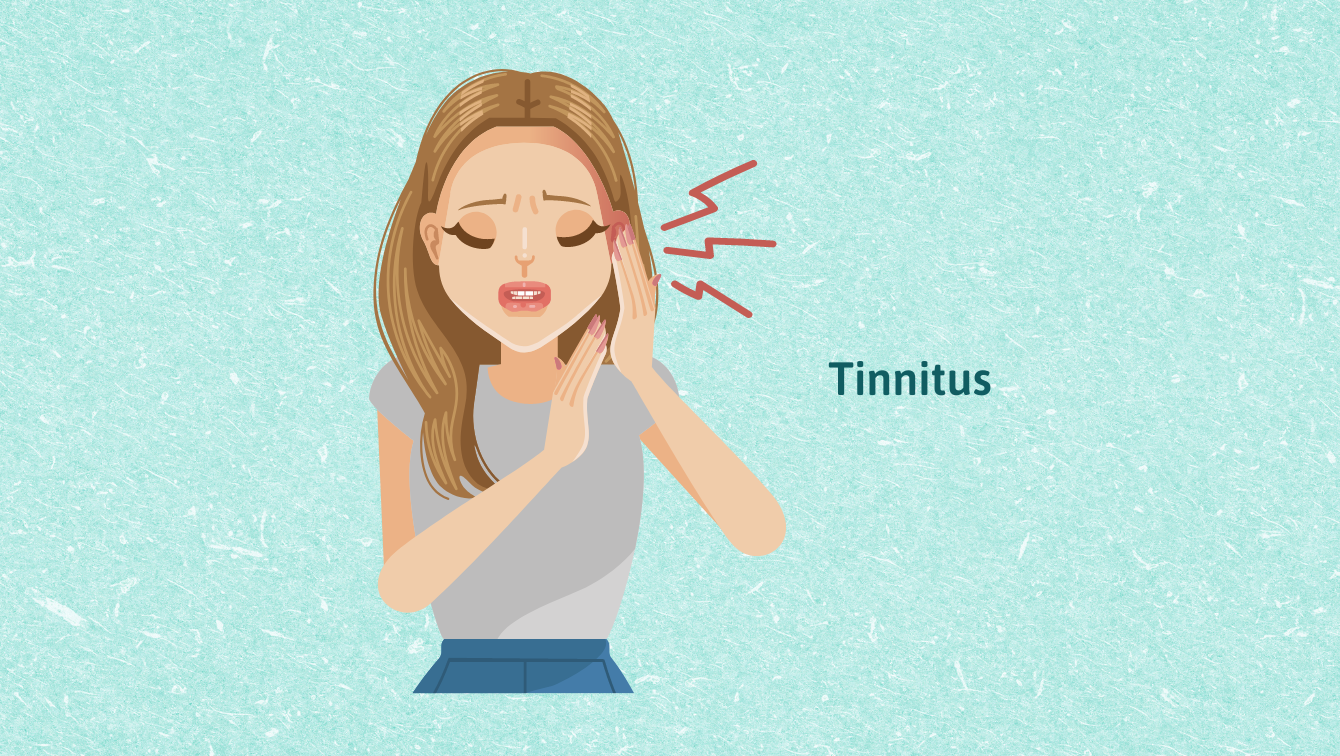
Mental health
- Anxiety[10]
- Depression[11]
- Cognitive impairment[12]
- Dementia[13]
- Substance abuse[14]
- Suicidal thoughts[15]
Loneliness and social isolation are also symptoms of several mental health conditions. Depression, anxiety, PTSD, bipolar disorder, and borderline personality disorder can all lead people to withdraw from social situations.[16]
You can deepen your understanding of this issue in this article on the importance and benefits of being more social.
What can you do about loneliness and social isolation?
We know that social isolation and loneliness can be detrimental to our health, but there are things you can do to overcome loneliness. Here are some helpful steps to improve your social health.
1. Foster a sense of belonging
The most important thing when trying to overcome loneliness and social isolation is to try to build a sense of belonging. This will mean different things for different people.
Try to find a group that reflects your identity where you feel able to express yourself and be understood. One group found that creating activities centered around diverse ethnic identities was more effective in helping older people to feel like they belonged.
People who feel that they have a purpose feel less lonely.[17] You don’t need to aim to save the world, but it can help to know that you’re making a difference in someone’s life.
Volunteering can be a huge help in allowing you to feel more connected to the people around you. Try to find something that feels meaningful to you and that you can comfortably commit to.
2. Understand the effect of being online
Being online, and using social media in particular, is an opportunity to create social connections. This can be helpful for people who are struggling with social isolation or loneliness, but it’s not always straightforward.
Social media can help some people to feel more connected with friends and family they can’t see regularly, but others can find it reduces their face-to-face social interactions and leaves them feeling lonelier.
Research suggests that limiting your social media use to 30 minutes per day can help reduce feelings of loneliness.[18] People also noticed that they were more intentional in how they used social media, rather than randomly scrolling, which might also help feelings of connection.
To help you make balanced use of social media, you might like to read this article on the effects of social media on mental health.
3. Consider a pet
We’re not going to trivialize loneliness and social isolation by suggesting that it’s easily fixed by a cat or a rabbit. There is, however, strong evidence that spending time with a companion animal (especially a dog) can reduce loneliness.[19][20]
Although some of this may be due to conversations while walking dogs, that doesn’t explain all of the difference.[21] It’s likely that being able to physically touch and stroke animals is just as important.[22]
You might not be able to look after a pet full-time, for example, if you have ill health. Dog-sharing apps such as BorrowMyDoggy let you form a relationship with a pet without being responsible for walking or feeding it. Many pet shelters will also allow you to “borrow” their animals, which helps socialize them and makes it easier for them to eventually be rehomed.
4. Look after your physical health
Taking care of your physical health won’t magically solve your feelings of loneliness, but it can help you to overcome some of the barriers to social interaction and give you the physical and emotional resilience to deal with the difficulties of feeling alone.
The problem isn’t that we don’t know what we’re supposed to do. We know we should get 7-9 hours of sleep per night, 30 mins of exercise per day, limit our alcohol, and eat a healthy, balanced diet. Most of us still don’t actually achieve those things. Especially if we’re feeling sad and lonely, we might not feel like we’re worth taking care of.
Instead of beating yourself up further, or thinking that you’re a lost cause, try doing one thing each day to look after your physical health. It might be stopping reading social media at 9 pm and reading a book to help you prepare for an early night or walking up the stairs at work rather than taking the elevator. Any change you make to improve your physical health is a good thing, so try to be proud of yourself for it.
5. Schedule your social life
It’s easy to assume that your social life should be something that develops naturally. In fact, being social typically takes a significant amount of effort. Setting aside time to be social each day can help you to stay in contact and create a habit of socializing.
Choose the kind of social contact that feels achievable and meaningful for you. You could email a friend, have a voice or video call, or meet up with someone in person. Regular contact seems to be more effective at building relationships, so try to set up regular calls or meet-ups.[23]
You might find more ideas on how to improve your social life in this article.
6. Seek treatment for mental health issues
Social isolation and loneliness can also be a symptom of some mental health issues. Depression, anxiety, PTSD, bipolar disorder, eating disorders, or being in an abusive relationship can make you feel the need to hide what’s going on and pull away from others.[24]
Seeking treatment for these kinds of conditions can help you regain a better social life. A qualified therapist can help you overcome shame, find ways to build your social circle, and create stronger, healthier relationships with the people you care about.
7. Work on your self-esteem
Low self-esteem can also contribute to feelings of loneliness. Improving your self-esteem can help you to feel less isolated and lonely and can make it easier to manage those feelings when they happen.[25]
One great way to improve your self-esteem is to find challenges in your life that you can overcome. As you deal with a problem, your self-esteem rises because you’ve proved that you have power over your own life.[26] Even something as simple as sitting down and spending an afternoon doing the admin you’ve been dreading can really help silence your inner critic.
Boosting your self-esteem isn’t easy, but we have more ideas to help in our article on how to build self-esteem as an adult.
Risk factors for social isolation and loneliness
Some people are more susceptible to social isolation, loneliness, or both than others. Here are some common risk factors for not having as much social contact as is healthy for you.
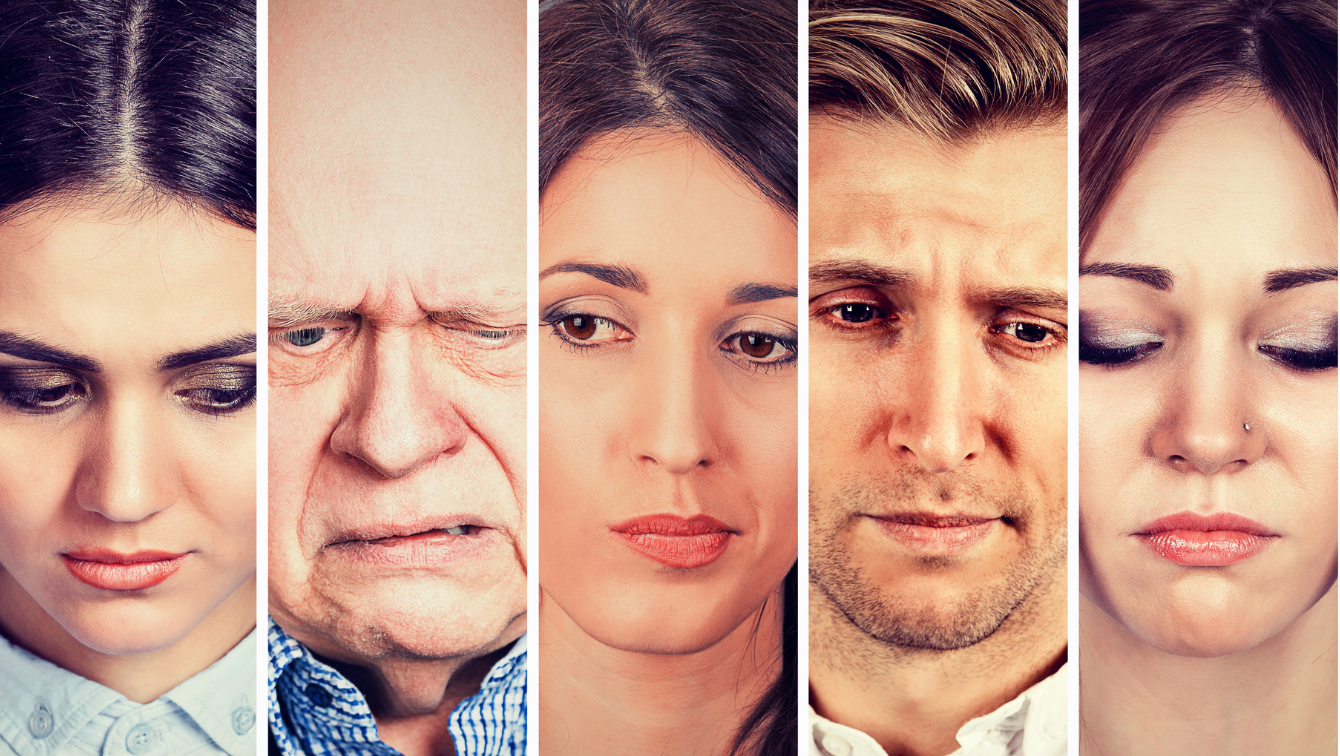
1. Genetics
Some people appear to have a genetic predisposition towards solitude-seeking behavior and loneliness.[27] This doesn’t mean that they’ll inevitably be lonely, but they are more likely than others.
2. Age
Most research around social isolation and loneliness has focused on older adults. Old age is often associated with living alone, the loss of family or friends, and a slow deterioration of the social relationships people might have had when they were younger.
In fact, anyone is susceptible to both social isolation and loneliness, and some studies suggest that it can be even more of a health risk for middle-aged people than it is for the elderly.[9]
If you are a middle-aged person feeling socially isolated, you might like to read this article on how to make friends after 50s.
3. Hearing difficulties
People with hearing difficulties can struggle to contribute to group conversations and may feel isolated even when surrounded by friends.[28] Others might still be socially isolated but not feel lonely if they see their hearing loss as a normal part of aging, move towards smaller gatherings, and build a closer social network.
4. Ethnic minorities
People from minority ethnic backgrounds, and especially immigrant communities, are at increased risk of social isolation and loneliness.[29] This can be due to a combination of language barriers, cultural misunderstandings, and the absence of familial support that they had come to expect.[30]
5. Being LGBTQ+
Being LGBTQ+ is another risk factor for loneliness. Particularly for older LGBTQ+ people, it may have been difficult to find a community in which they felt accepted and safe. Others can still be ostracized by family members or feel unable to be their authentic selves with friends they haven’t come out to yet.[31] This lack of close social ties can leave LGBTQ+ individuals feeling isolated and alone.
6. Living alone
It might sound obvious but living alone makes you more susceptible to social isolation or feelings of loneliness. Different living arrangements have different degrees of protection. For example, living with a partner may provide you with a closer interpersonal interaction than living in a houseshare.
7. Barriers to moving around your local area
Anything that makes it harder for you to safely leave your home can make it more likely that you experience social isolation and loneliness. This could mean living in a remote or rural area, not feeling safe in the area around your home, or having mobility difficulties.
8. Poor health
Experiencing poor health can also make it more likely that you are socially isolated. You might lack the energy to spend time with others or be frustrated at not being able to take part in activities you would normally have enjoyed. Regular hospital visits or treatments can also have a significant impact on how much time you have free for being social.
Social isolation and COVID-19
We can’t talk about loneliness and social isolation without addressing the impact of COVID-19. Across the world, many people were prevented from being physically close to others, and loneliness skyrocketed.[32]
Social distancing doesn’t always lead to social isolation. Many people were able to use technology to stay connected to important people in their lives. You can continue using video calls or online chats if they feel fulfilling for you.
In the aftermath of COVID, lots of us are recovering from a form of social trauma and need to learn how to connect with others again. This is sometimes more difficult because of lingering health anxiety or other worries.
The aftermath may last for many years, but there are some potential upsides. People are thinking more carefully about their social networks and being more selective about who they spend their time with.[33] If you’re struggling with post-COVID loneliness, try journaling about what you miss most. This can help you understand what types of social connections to build in the future.
Common questions
What if I like being alone?
It’s perfectly possible to be socially isolated without being unhappy about it. Some people simply enjoy solitude more than others. There are still some health risks of isolation, even if you’re not lonely, as you may experience more cognitive decline or be more at risk if you have an accident.
